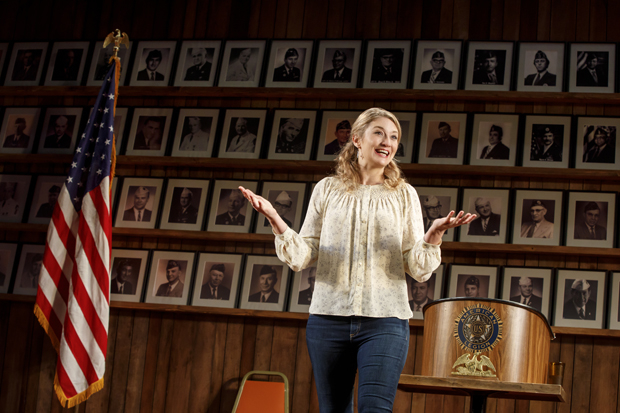First Person: Heidi Schreck's Personal History With the Constitution
The performer-playwright on how a 231-year-old document inspired her off-Broadway play.

(© Zak DeZon)
I first had the idea to make What the Constitution Means to Me 20 years ago, influenced by the work of brilliant theater artists like Lisa Kron, Holly Hughes, María Irene Fornés, Adrienne Kennedy, and Anna Deavere Smith who were creating formally groundbreaking work that connected the personal to the political. These works inspired me to question not only whose stories get told, but how they get told. They also showed me that all theater is political, whether the writer chooses to make that explicit or not.
This piece marks the first time I decided to deal with political ideas overtly. I knew I wanted to shape the performance around this competition I did as a kid called the "American Legion Oratory Contest," where I would travel the country giving speeches about the Constitution for prize money. This contest made it possible for me to go to college, and it also taught me I had a right to question our founding document. I wanted to explore the rules of the contest as a structure and use them to examine the effect the Constitution has had my own body, and the bodies of the women in my family. This turned out to be more than I could handle at the time! I researched for a year, and then moved on, feeling a bit defeated.
Then, a decade ago, after a tough conversation with my mom, I had a revelation about my own family history in relation to this document. I have a history of physical and sexual violence in my family, on my mom's side (not in my own nuclear family, thank god. My dad is fantastic), and I finally started to feel in my bones the truth that this history was not simply a result of "personal" violence — the violence of a few "bad men" — but the result of systemic and legal violence, a violence that has its roots in misogyny, racism, and white supremacy. I studied feminist legal theory in college, so I had some practice analyzing our Constitution, but it wasn't until I specifically did the work of relating these laws to my own life — and to the lives of my mom, my grandma, my great-grandma, my great-great-grandma — that I began to understand this document in a visceral way.

(© Joan Marcus)
I first performed the full piece in 2016, when I thought we were about to elect our first woman president. The piece has not changed much, but the cultural climate around it has. It has been fascinating, and troubling, for me to watch this work become more and more relevant. It has also become, in some ways, scarier to perform. I didn't realize how terrified I was to talk about these realities until I had to step on a stage and speak them out loud. My mom has always been open about her abuse and has publicly supported other survivors her whole life, so I assumed this history would be "easy" for me to share. It wasn't. Now that I know how much it costs to talk about these things, I have a greater admiration for my mom's courage.
Performing this piece has been transformative for me. I have incredible collaborators in my director Oliver Butler; actor Mike Iveson, who serves as a living support system onstage; and two brilliant teenage debaters, Rosdely Ciprian and Thursday Williams, who give me hope for our future.
I think of the show as a kind of healing ritual. That scares me to say because I am allergic to sentiment. But a ritual is a living thing, it's an action you take and hope that something comes of it — its purpose is not to give you answers. It's something I try to live through every night in the hope that it moves me, and others, to a new place.








